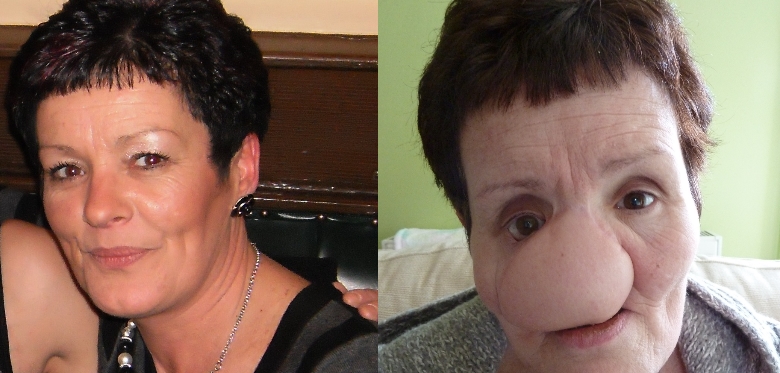The Royal Albert Edward Infirmary failed to diagnose our client’s stage four cancer of the mouth over a period of a year.
By the time treatment commenced, 44 year-old Andrea McNicholas had to have a 20 hour mutilating operation during which her upper jaw was removed along with all of her nose.
Andrea was first referred to the Royal Albert Edward Infirmary by her dentist in June 2010. The radiologist recommended that a biopsy should be taken after a lesion was spotted. When she returned to the hospital two weeks later, she was not advised of the scan results and was instead prescribed a week’s course of antibiotics.
Over the course of the next 12 months, Andrea’s symptoms progressed until eventually she started to suffer pins and needles in her right cheek and upper lip. Her dentist continued to refer her back to the hospital under the care of the maxillofacial surgeons but it was not until July 2011 that a biopsy was taken of the lesion in her mouth which confirmed stage four cancer of the mouth.
Andrea had to undergo three courses of chemotherapy to shrink the tumour before surgery could be performed. She then endured the 20 hour mutilating operation with her neck being dissected and part of upper jaw and nose removed. Following the surgery Andrea had to be fed through a tube as well as go through post-operative chemotherapy and radiotherapy. She suffered a cardiac arrest due to complications from the therapy setting back her ability to commence reconstructive surgery as doctors had to ensure her heart had recovered.
Andrea was not able to commence reconstructive surgery until August 2013 and endured a long and painful journey of multiple operations spanning the next couple of years. Due to the extent of surgery carried out initially and amount of bone and tissue removed, the reconstructive surgeries provided a very limited improved appearance. As such and to this present date she remains disfigured and is affected psychologically.
"This has had a dramatic effect on my mental health, as I'm constantly stuck indoors and feel as though I am unable to live my life," said Andrea.
"I don't leave the house unless it is for appointments as I get tired very quickly. I am also extremely paranoid about the way I look. I feel as though everyone stares at me, regardless of whether I wear big glasses or cover the majority of my face.
"I'm not the person I once was, in respect of my appearance or my personality.”
If diagnosed in time Mrs McNicholas would have undergone a left neck dissection with removal of some of her upper jaw and septum, but not her nose.
Reconstructive surgery would have been carried out at the same time to repair this with implants being later inserted in place of the removed teeth.
Chemotherapy or radiotherapy would not have been required and she would have been able to eat, work and essentially lead a normal life without any impact on her sight, hearing or mobility and having avoided a cardiac arrest.
Stephensons settled with the Wrightington, Wigan and Leigh NHS Foundation Trust for the sum of £900,000 and it was admitted that Mrs McNicholas suffered a worse outcome than would have otherwise been the case.


